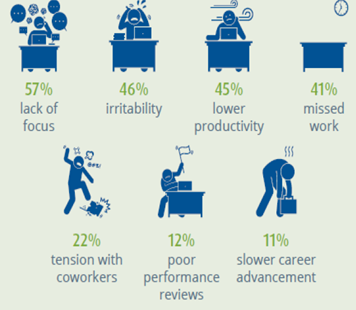Management Topic: Supporting Employees with Mental Health Conditions
Dear Colleagues,
More than 1 in 5 U.S. adults live with a mental illness according to the Center for Disease Control and Prevention (CDC).
The National Alliance on Mental Illness (NAMI) defines a mental health condition as a medical condition that disrupts a person’s thinking, feeling, mood, ability to relate to others, and daily functioning.
It’s important to remember that a person’s mental health can change over time, depending on many factors. When the demands placed on a person exceed their resources and coping abilities, their mental health could be impacted. For example, if someone is working long hours, caring for a relative, or experiencing economic hardship, they may experience poor mental health.
Mental health issues can significantly impact job performance as illustrated below:

Under State and Federal law, qualified employees with a disability have the right to request reasonable accommodations that can help them perform their job. Below are some common questions that you may have as a supervisor:
1. What is considered a disability?
- A disability is a mental or physical impairment that “limits a major life activity" (e.g. caring for oneself, performing manual tasks, walking, seeing, hearing, breathing, and work)
- Mental disabilities include a wide range of mental or psychological disorders or conditions that limit a major life activity (e.g. clinical depression, bipolar disorder, PTSD, OCD, anxiety, etc.)
2. What is a reasonable accommodation?
- Any appropriate adjustment to an employee’s job that would enable the employee with a disability to perform the essential functions of their job.
3. What do I do if I notice or am told that one of my employees may have a mental health condition?
- Step 1: Ask how you can help them.
- Sample language if you notice changes in behavior: “I want to talk with you because I’ve noticed some changes in your behaviors and work performance and I’m concerned. Is there anything you can think of to get back on track? Is there anything I can do to help you?”
- Sample language if your employee makes you aware of challenges with their mental health: “Thank you for sharing this with me. You should know that you can speak confidentially to one of our counselors in the Staff & Faculty Counseling Center. Additionally, if you think an adjustment to your work would be helpful to you, I can connect you with Employee Disability Management Services (EDMS) to make that request. Our conversation will not affect your job and a referral to the appropriate resources would be very helpful.”
- Step 2: If you become aware that your employee may be in need of an accommodation, connect them with Employee Disability Management Services (EDMS) to initiate an Interactive Process.
- Note that the employee does not need to use the word “accommodation” in order to make you aware that they may be in need of an accommodation. So long as you are put on notice (either directly or indirectly) that they may need an accommodation due to a disability, you have an obligation to initiate an interactive process. You can initiate this process by contacting EDMS (RTWmail@irm.ucla.edu), who will facilitate the Interactive Process.
- Example of an indirect notice of a need for an accommodation: “I’m having trouble finishing my work in time because my anxiety makes it hard to concentrate.” NOTE: supervisors should not request medical documentation from employees as part of the Interactive Process. EDMS will gather the necessary medical documentation.
4. How can an employee request a Reasonable Accommodation?
- An employee can initiate the request for an accommodation in several ways:
1. Complete and submit a Reasonable Accommodation Request form which is available on the EDMS website.
2. Inform the employer (i.e. supervisor and/or Human Resources Representative) that they need an accommodation to enable them to perform the essential functions of their job.
3. Send an email to EDMS at RTWmail@irm.ucla.edu and request accommodation assistance.
- Using any of these means to request an accommodation will trigger the “interactive process.”
5. What is the Interactive Process (IP)?
- Facilitated by Employee Disability Management Services (EDMS) Consultants, the IP is an ongoing dialogue conducted in good faith, between the employee (or applicant) and appropriate representatives of the University about possible options for reasonably accommodating the employee’s disability. Discussion topics include the functional limitations and how they impact performing the essential functions of the job, exploring reasonable accommodations, and how reasonable accommodations will be implemented. The purpose of this discussion is to determine what (if any) reasonable accommodations may be needed and can reasonably be implemented.
6. How will the accommodation process with EDMS begin?
- The employee will be assigned an EDMS Consultant who will assist them in engaging in the IP and exploring reasonable accommodations that would enable the employee to perform the essential functions of their job. In addition, EDMS can coordinate an ergonomic and/or assistive technology evaluation as needed.
7. Do I, as a supervisor, need to request medical documentation from my employee’s physician?
- No. Supervisors should not request medical documentation.
- The EDMS Consultant will ask you for appropriate documentation from the employee’s healthcare provider to assist them in determining appropriate accommodations.
8. What are some examples of reasonable accommodations?
- Some examples include, but are not limited to:
- Modifications to scheduled break times
- Noise-canceling headphones
- Moving workspaces to help reduce distractions
- Rest area/private area to take a break
- Support animal
- Attend meetings remotely
- Work-from-home options
- More frequent reminders of tasks and due dates
9. How is a reasonable accommodation determined?
- The IP serves as an open exchange of information about the employee’s functional limitations and how they impact job performance. The employee, the EDMS Consultant, and department supervisors/managers discuss possible accommodations that would be effective in meeting the needs of the employee’s medical condition or disability and also the operational needs of the department. While the employee’s requests for accommodation are given priority, with input from the EDMS Consultant, the organization selects and implements the reasonable accommodation that is most effective.
10. What happens if I do not accommodate my employee and/or fail to initiate the Interactive Process?
- It is against State and Federal law, as well as University Policy, to fail to accommodate an employee. Thus, it is imperative that you connect the employee with EDMS once you know that an employee may be in need of a reasonable accommodation. This will allow EDMS to facilitate the IP.
- Failure to accommodate the employee appropriately may lead to internal and/or external complaints. Please contact your Employee & Labor Relations representative for guidance if complaints arise.

Interested in reviewing prior months’ topics? Visit our Monthly Management Tips website.
Do you have feedback, questions or a suggested topic you would like to learn more about? Please email: managementtips@ucla.edu.
Want to receive Monthly Management Tips emails? Sign up for our list!

